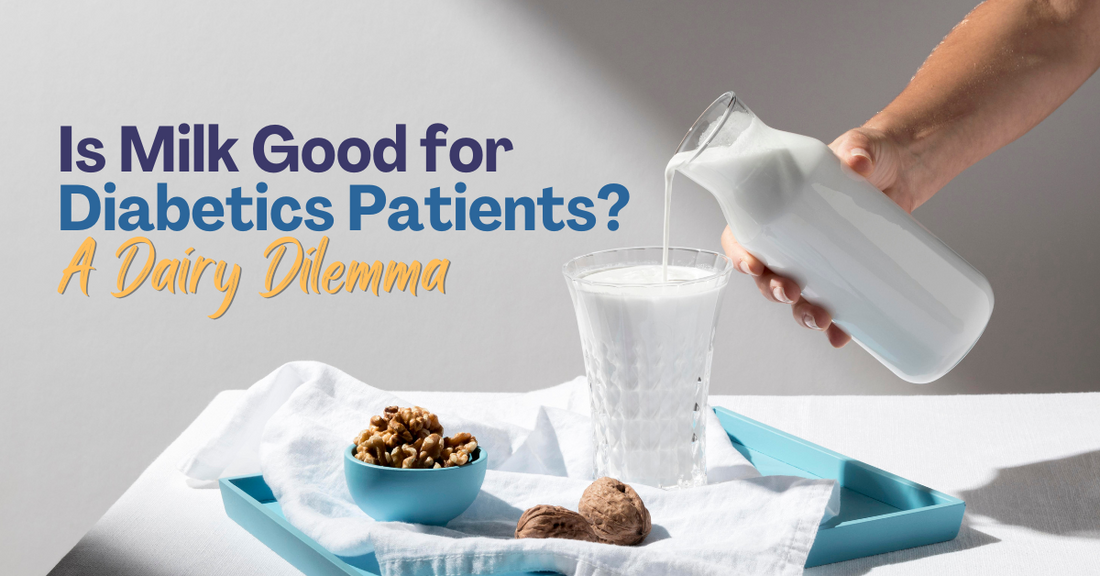
Is Milk Good for Diabetics Patients? A Dairy Dilemma
Share
Milk is a household staple. People all over the world enjoy it for its creamy texture and nourishing qualities, whether it's splashing it into coffee, poured over cereal, or gulped down as a refreshing glass. The answer to this question for people with diabetes becomes: Is milk a friend or foe? Can it fit within a diabetic diet without provoking blood sugar spikes?
These are important questions, as every choice matters when balancing nutrition and health. While milk offers essential nutrients like calcium and protein, not all types of milk affect the body in the same way. In this blog, we’ll explore whether milk deserves a spot in a diabetic-friendly diet and which types might be the healthiest options for those living with diabetes. Keep reading to uncover the truth about milk and diabetes.
Table of Contents
Is Coconut Milk Good for Diabetics?
Coconut milk has become one of the most popular alternatives to regular dairy, providing a creamy texture and unique flavour. However, for diabetic patients, the question remains: Is milk good for diabetics patients, especially when it comes to coconut milk? While it's lower in carbs compared to regular milk, coconut milk contains fats that can impact blood sugar levels differently. The secret to enjoying coconut milk lies in selecting the unsweetened version and moderating its intake to gain without overloading calories or fats.
Following are a few points to consider coconut milk for diabetics:
- Low Carb Content: Unsweetened coconut milk has less carb content compared to dairy milk, which is beneficial in controlling blood sugar.
- Abundant in Healthy Fats: These can provide energy; however, one must be in moderation.
- Avoid Sweetened Varieties: Added sugars can spike blood sugar levels, negating their benefits.
- Portion Control is Key: Even healthy alternatives can cause issues if overconsumed.
Is Soy Milk Good for Diabetics?

Soy milk is also one of the most consumed alternatives to regular dairy milk, and people often praise this milk for its nutritional properties. So, is milk good for diabetics patients in the case of soy milk? The answer is yes, with some considerations. Soy milk is quite low in carbs and has enough protein, making it a suitable choice for blood sugar regulation. It is also a rich source of healthy fats, along with vitamins and minerals like calcium and vitamin D.
However, as in other milk alternatives, choose unsweetened soy milk for diabetes to avoid added sugars, which can raise blood sugar levels. Moderation and wise selection are necessary for enjoying the benefits of soy milk for diabetics.
Is Lactose-free Milk Good for Diabetics?
Lactose-free milk is a good option for people who face problems digesting lactose. But for diabetic patients, the question remains: Is milk good for diabetics patients, especially lactose-free milk? Lactose-free milk offers many of the same benefits as regular milk. Thus, it is replete with calcium, proteins, and other essential nutrients. The main difference is that the lactose is broken down, making it easier for the body to digest. Still, one should choose unsweetened versions to avoid unwanted sugar intake.
Here's why lactose-free milk can be a good choice for diabetics:
- Rich in Nutrients: It provides protein and calcium, which support bone health and muscle function.
- Very easily digestible: Good for those who are lactose intolerant.
- Low Glycemic Impact: Won't cause blood sugar to rise rapidly if it is unsweetened.
- Unsweetened: Select it to avoid adding sugar to enhance blood sugar levels.
Is Milk Powder Good for Diabetics?
Milk powder is a convenient and shelf-stable alternative to fresh milk, but is milk good for diabetics patients when it comes to milk powder? While it offers the same nutrients as liquid milk, it's important to be cautious. Milk powder can contain higher concentrations of sugars due to the evaporation process, especially in sweetened varieties. This could cause an increase in blood sugar levels, which is dangerous for diabetics. Still, if you use unsweetened milk powder and only consume it in moderation, it may be a good source of protein, calcium, and other essential vitamins.
Some key points about milk powder for diabetics are the following:
- Nutrient-Rich: It provides protein, calcium, and vitamins just like normal milk.
- Added Sugars Check: Select unsweetened for less sugar.
- Eat It in Moderation: Avoid overloading your diet with too much sugar from this product.
- Think of Your Blood Sugar: Test how the milk powder impacts your body through your blood sugar.
Is Milk Chocolate Good for Diabetics?

Many love milk chocolate as a sweet treat, but is it suitable for diabetics? Milk chocolate is generally rich in sugar and unhealthy fats that will trigger blood sugar levels. Enjoying it is acceptable from time to time, but moderation or switching to healthier dark chocolate with at least 70% cocoa is ideal so you can satisfy your cravings without greatly affecting your blood sugar.
Here are some tips on milk chocolate for diabetics:
High in Sugar: Milk chocolate contains added sugars that raise blood sugar.
Choose Dark Chocolate: Select dark chocolate that contains less sugar and more cocoa.
Portion Control: The odd small piece is fine, but overindulgence should be avoided.
Check Labels: Low-sugar or diabetic-friendly options should be sought.
Is Condensed Milk Good for Diabetics?
Condensed milk is a very popular ingredient in making desserts and sweet dishes with its rich, creamy feel and sweetness. But to the diabetic patients, how good is milk? Not, because traditional condensed milk contains added sugars, meaning it is not suitable for those who are managing this disease. The high sugar it contains will cause sharp jumps in blood sugar levels; thus, it is very challenging to maintain stable glucose levels.
Even unsweetened condensed milk is not free from added sugars and is concentrated with higher quantities of natural sugars than regular milk. For diabetics, it is better to avoid condensed milk or use it in very minimal proportions. Instead, finding alternatives—low-sugar or plant-based condensed milk can be better alternatives for creating diabetic-friendly recipes that do not compromise health.
Frequently Asked Questions
Can a diabetic patient drink milk?
The carbohydrates in milk degrade and become sugar in your system. Both type 1 and type 2 diabetes require careful carbohydrate management. Drinking too much milk may result in a blood sugar increase. If you are diagnosed with diabetes, your doctor will likely send you to a trained dietician.
Which milk is the best for diabetes?
Unsweetened or no protein. Flax milk.
This is another sort of milk that contains fewer carbs. Unsweetened flax milk contains as few as 1.02 g of carbs, making it a perfect choice for diabetics. Flaxseed milk has no lactose or cholesterol, making it a heartily healthy alternative to cow's milk.
Does milk raise blood sugar a lot?
These are the facts. Milk includes 12 grams of sugar per cup, regardless of whether it's whole, 2%, 1%, or skim. Still, you shouldn't be concerned while you're standing in the dairy aisle, looking over the nutritional labels on milk bottles.
